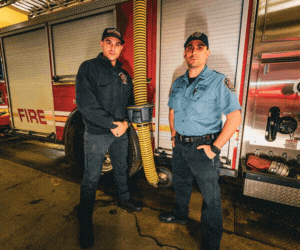Are You Carrying More Weight Than You’re Putting Down?
By: Dr. Anastasia Miller Ph.D.
Imagine if we could feel better and be less stressed out by simply letting some of our mental baggage go? If that’s true, how do you unload in a safe manner?
Firefighters often focus on the physical weight of various aspects of the job (those extension ladders are heavy) but they don’t always think about the emotional or psychological weight of the job. There are many aspects of the job which gives it an invisible but heavy burden to be carried. The first contributors we think of are the obvious; Firefighters can see horrific things. They respond to terrorist attacks, to mass casualty incidents, natural disasters, and the list goes on. These can leave images that are seared in the mind and are hard to shake.
How Mental Injuries Occur
Firefighters and EMS personnel are also sometimes, deliberately or indeliberately, injured by the general public they are trying to help. These repeated events can be detrimental to a firefighter’s well-being and are clear contributors to the high rates of Post-Traumatic Stress Disorder (PTSD), sleep disorders, and other mental health issues seen in emergency services. But some of the contributors may not be as obvious. Firefighters often see people on the worst days of their lives, which can include injury, death, and destruction. Witnessing these life changing events in others and helping them deal with the aftermath can lead to the lesser-known Secondary Traumatic Stress (STS) – which is symptomatically almost identical to PTSD, just the source of the trauma is through these “secondary” sources. The chronic work stress of the high job demands, low job control, and shift work also contributes to burnout, which can further exacerbate the “weight” of the job. Only so much can be done to reduce these exposures (the job is what the job is), so what can firefighters do to help “lighten the load” of the job?
There are no Simple Answers
There is no “one size fits all” answer to this. A lot of it has to do with personal preferences and coping mechanisms. It can range from more formal activities such as Critical Incident Stress Debriefing (CISD), visiting a Chaplain, or seeing a mental health professional to talk about the stresses of the job. These are often considered the “gold standard” and what most professionals recommend – but these aren’t the answers for everyone. These may not be offered by your department or may be undesirable for other reasons such as personal finances or because you don’t want the other people in your department to know you are seeking help.
There are more affordable and informal methods, such as peer support groups where they meet twice a month to get things off their chest. Departments I know that utilize this find it very beneficial. Your coworkers know exactly what you went though and might be struggling with the same runs. Or maybe not. Maybe different runs are bothering them, and they just need to talk about it with someone who was there. For example, runs where pediatric patients are involved are often difficult for people to process, but can be even more so if you have a child that age. One of the great things about the fire service is the sense of brotherhood – you might as well use it to make sure everyone is okay both physically and mentally.
Getting Help From Your Peers
There is no need to make “peer support” anywhere near this formal, it could just be a spontaneous conversation that occurs between two shift members – but it IS important to make sure that everyone is ready and open to discussing the things bothering you. I knew a social worker who worked with veterans and talked about how they would “slime” their friends and loved ones all the time. This is what she called it when her clients would suddenly start discussing the horrific images which were keeping them up at night to people who were unprepared – the veterans were taking the first step in talking about their issues, but they were inadvertently traumatizing their loved ones in the process. There is quite a bit of overlap between the fire service and the armed forces (and many veterans in the fire service), and I like the visual of flinging emotional slime on unsuspecting victims, much like slimer did in ghostbusters. This is a big reason why I don’t recommend talking to family and friends in detail about EVERYTHING that is troubling you, unless they have acknowledged that they are ready to hear about difficult things. I also recommend checking with coworkers to make sure they are okay to talk about a specific run – maybe they are still processing it and aren’t ready to discuss it yet. Everyone processes at a different speed and forcing people to talk too soon can be detrimental to them.
How We Choose Our Access to Help
I am also unfortunately in the maligned demographic referred to as “millennial” – which by age, according to experts, make up almost half of the fire service when including both volunteer and career departments – which means I do also recommend the use of technology. In recent years, there have been many websites which have popped up specifically for firefighters on dealing with the job, just be aware that they are not always the easiest to read and sometimes have suspect information. I personally recommend firefighters explore mobile health apps (also known as mHealth). They are also not all created equal (some of them out there are really not very good) – but there are also good ones. There are proven apps like Headspace which help with mindfulness and dealing with stress. Headspace and other cognitive therapy based mindfulness training apps like it are often fairly affordable and can really help some people. Another one I recommend people explore is PTSD Coach from the Veterans Administration. It is free and provides resources on dealing with not just PTSD but stress, depression, and loved ones going through mental health concerns. These are just a couple of the countless Apps out there. Technology based outlets allow firefighters to deal with stress in a manner which affords both privacy and personal control, things firefighters often care about.
Just like no one expects a single firefighter to put the fire out by themselves, it is unreasonable to expect a single firefighter to shoulder the psychological burden of the job. These are some tools you can utilize, but usually the first step is to ask for assistance.
After working in the field as an EMT/Firefighter, Dr. Miller pursued higher education at the University of New Mexico, Indiana University Purdue University Indianapolis, and the University of Central Florida. She is currently an Assistant Professor at Texas Woman’s University. Her research interests include improving the environmental, behavioral, and psychosocial aspects of the daily work environment for first responders, with a specific focus on Fire/EMS personnel. She also focuses ways to provide organizational support to improve the professional quality of life in first response agencies.
Photo by pexels
Podcast
Contests & Promotions
















